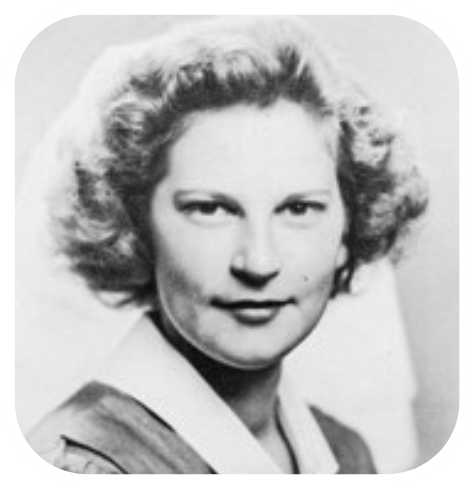Celebrating Pat Fisher’s Legacy (March 18, 1925 – October 25, 2022)
Seventy-seven years after graduating as an occupational therapist from the University of Toronto, Pat Fisher passed away on October 25, 2022. During those years she remained committed to occupational therapy and its development, leaving a legacy that resonates today as the profession continues to grow.
Lynn Cockburn, Judith Friedland, and Barry Trentham celebrate Pat: |
 |
Leaders come in many forms. Some are bold luminaries, visionaries, or fierce disruptors of the status quo. Others, like Pat Fisher, lead by thoughtfully posing questions and taking action with colleagues to apply ideas into everyday practice. Pat’s life offers lessons for our profession today.
Engaged in Life
If we were to use one word to describe how Pat Fisher lived her long life, we would say, “engaged”. Pat was enthusiastically and persistently engaged with life – in all its aspects: social, environmental, cultural, emotional, interpersonal, and political. Her engagement can be seen in the many friendships she made and kept, in the gardens that she tended, in her volunteer work with her church, and her role with U of T’s Alumnae Theatre. She never fell behind in current affairs. Her engagement was particularly evident in her professional life and her approach to patients.
Living in the Nexus of Practice and Academia
Throughout her long career, Pat consistently found ways to improve occupational therapy practice and contribute to occupational therapy education. From the day of her graduation in 1945, Pat staunchly supported the OT program at U of T and its Alumni Association. She believed that developing an evidence base would be beneficial to strengthen the understanding of how occupational therapists facilitate change, and she also hoped that the creativity and innovation that had been hallmarks of clinical practice would not be lost.
In addition to her regular work as the Clinical Supervisor at Queen Elizabeth Hospital in Toronto, Pat and two OT colleagues, Marion Boys and Clare Holzberg, developed the OSOT Perceptual Evaluation Tool Kit and Manual. With the help of research consultant, David Reid, they validated the assessment and published their work in the American Journal of Occupational Therapy in 1988. In addition to her work as a Clinical Associate at U of T, Pat led the Department’s Continuing Education Program.
Although she officially retired in 1990, Pat continued to support the profession for another 30 years and was awarded the OSOT Honourary Life Membership Award in 1996. Most recently she recruited seniors, who would share their stories in courses on aging, continuing her commitment to supporting excellent learning experiences for students. Believing that we all need to play our part to make sure that everyone feels included, and applying that philosophy throughout her life, she advocated for accessibility in various settings, well into her 90’s.
On Not Fitting In
Pat Fisher was steadfast in her commitment to the ideals and the practice of occupational therapy and championed efforts to ensure its necessary place in the health system. While being frustrated and discouraged at times with the public’s (and other providers’) limited awareness of our offerings, she viewed the problem as a function of the profession’s lack of fit within medical institutions whose focus was on fixing broken bodies and were less concerned about quality of life. As she recounted to us many years ago: “encouraging our patients to be active and creative . . . doesn’t always fit with the rules and order that a hospital wants to maintain. Besides, we generally don’t deal with life and death situations; we deal with quality of life – that too, is a different perspective than what is held by many other health professionals”. Pat Fisher did not apologize for this different perspective, but embraced it.
Persist Until You (We) Find Our Place
Pat’s gentle smile belied her fierce determination and ability to persist, to find ways to continue, even when there were many obstacles. Her legacy reminds us to be engaged in our personal and professional lives. It cautions us not to lose sight of our values and beliefs as we continue to build the future of our profession and to celebrate our different perspectives.